Cue Tips
At McTier Billiards, we have the equipment and expertise to perform most cue tip and ferrule repairs. When you're ready to up your game with a new tip, give us a call. We stock some of the best tips available and deal directly with the manufacturers or reputable distributors to ensure all tips are genuine.
Professionals replace their pool cue tips every six months on average, depending on the amount of time they spend practicing for tournaments. In contrast, most amateur pool players leave their cue tip on until it fails. Either the cue tip breaks off or it starts to come apart.
Layered cue tips are available in a range of hardness or densities from super soft, soft, medium, and hard. Soft tips are usually easier to scuff and therefore retain chalk better than hard tips. But soft tips are more likely to flatten or mushroom, requiring more maintenance than hard tips. Hard tips also have great hit feel and tone compared to soft tips. Arguably, the softer cue tips can apply more english, but there is disagreement about whether soft tips or hard tips afford more control. While most professional players use hard tips, this does not necessarily mean that all amateurs should also use hard tips. The difference between pro and amateur playing environments results in different tip requirements.
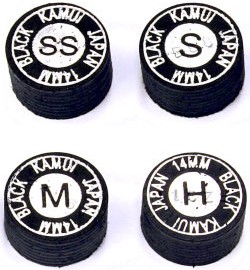 Made in Japan, 10 layers of pig skin leather are glued together without diminishing porosity so that Kamui tips can hold more chalk. The greater porosity also allows the Kamui tip to more closely retain its original shape. Additionally, Kamui tips are humidity-resistant. Kamui claims that their tips will last "on average 20-30% longer than the average layered pool cue tip."
Made in Japan, 10 layers of pig skin leather are glued together without diminishing porosity so that Kamui tips can hold more chalk. The greater porosity also allows the Kamui tip to more closely retain its original shape. Additionally, Kamui tips are humidity-resistant. Kamui claims that their tips will last "on average 20-30% longer than the average layered pool cue tip."
 Tiger Products award winning laminated cue tips are trusted by professionals for ultimate control and accuracy. Made with the best boar hides and specially developed manufacturing processes in the USA.
Tiger Products award winning laminated cue tips are trusted by professionals for ultimate control and accuracy. Made with the best boar hides and specially developed manufacturing processes in the USA.
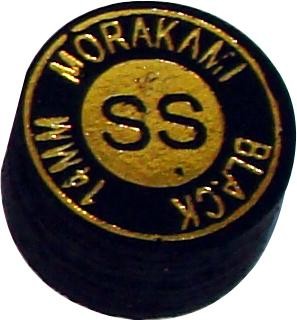 Morakami black cue tips are relatively new to the USA market and this Japanese company might need some help with English translation. Let's just say that Morakami tips stay on the cue ball.
Morakami black cue tips are relatively new to the USA market and this Japanese company might need some help with English translation. Let's just say that Morakami tips stay on the cue ball.
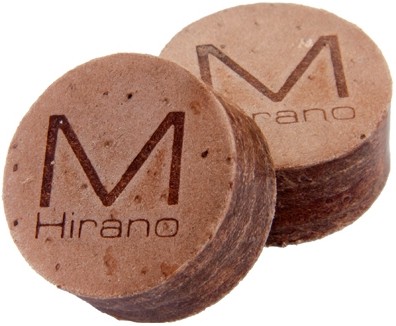 Hirano tips have four thicker layers, less than half of what you find on other tips, to have no transitions into other layers on the radius of the tip. The result is consistency - it is a good playing tip and lasts a long time. We carry Hirano tips in soft and medium but these tips tend to run hard so soft is recommended for the average player.
Hirano tips have four thicker layers, less than half of what you find on other tips, to have no transitions into other layers on the radius of the tip. The result is consistency - it is a good playing tip and lasts a long time. We carry Hirano tips in soft and medium but these tips tend to run hard so soft is recommended for the average player.
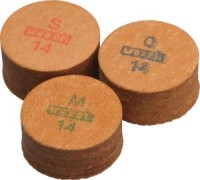 Moori III cue tips are made of nine layers of boar leather. Moori was possibly the first manufacturer to use laminations to make a cue tip. Until laminated pigskin, pool cue tips were (and still are) made of bovine leather, which is much thicker than porcine. Moori tips received international recognition during the 1994 World Pool-Billiard Association 9-ball Championship. Arguably, Moori tips have been endorsed by more professionals than any other layered tip.
Moori III cue tips are made of nine layers of boar leather. Moori was possibly the first manufacturer to use laminations to make a cue tip. Until laminated pigskin, pool cue tips were (and still are) made of bovine leather, which is much thicker than porcine. Moori tips received international recognition during the 1994 World Pool-Billiard Association 9-ball Championship. Arguably, Moori tips have been endorsed by more professionals than any other layered tip.
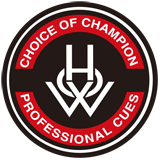 HOW Brand products are the creation of former Chinese national pool coach HOW-San. HOW-san uses 20 years of experience as a player and coach to develop professional level pool equipment. HOW Brand cue tips helped Shane Van Boening win the 2023 WPA World 8-Ball Championship.
HOW Brand products are the creation of former Chinese national pool coach HOW-San. HOW-san uses 20 years of experience as a player and coach to develop professional level pool equipment. HOW Brand cue tips helped Shane Van Boening win the 2023 WPA World 8-Ball Championship.
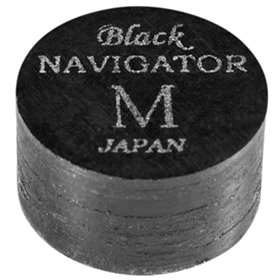 Navigator Black
Navigator Black
McDermott's Navigator Black cue tips feature 10 layers of Japanese pigskin leather that are assembled using a proprietary adhesive. This prevents oxidation so that the tip won’t get harder after short usage. They are the most adaptable Navigator tips, allowing players to shape and mold the tip over time to fit their style of play.
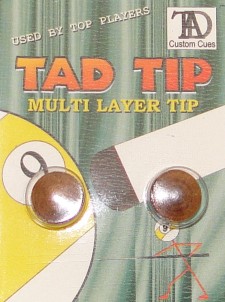 McTier Billiards carries the Tad Multi Layer cue tip, available in medium and hard.
McTier Billiards carries the Tad Multi Layer cue tip, available in medium and hard.

